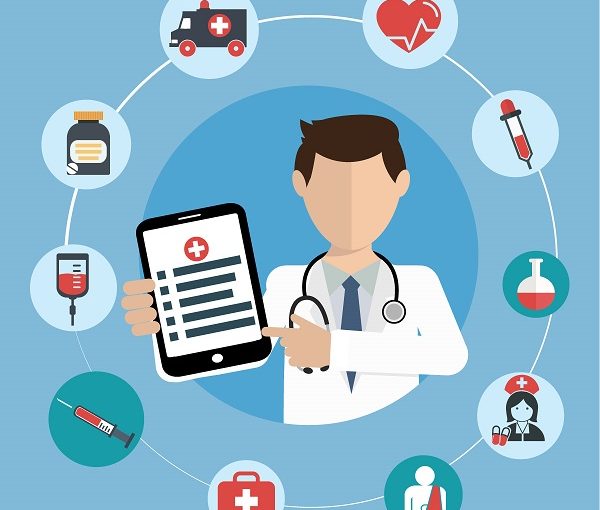How Artificial Intelligence can Impact the healthcare industry positively
Healthcare analytics has evolved over the past decade and Artificial Intelligence (AI) has recently made sound progress in the field with brilliant results.
Analytics and AI have always complemented each other and amassed a huge amount of clinical and operational data that can learn historical patterns for making insightful predictions about the future. AI is now useful for boosting revenue while also being crucial in finding new medications for ailments as part of healthcare IT solutions.
Particularly with the help of automation, machine learning, and AI, healthcare practitioners, hospitals, insurance companies, and all stakeholders of the industry have been impacted – in positive, substantial ways.
A 2016 report by CB Insights revealed that 86% of healthcare providers, life science companies, and tech vendors for the industry are leveraging artificial intelligence for its needs. By 2020, it is expected that these companies will spend close to an average of $54 million on AI-based projects. One can expect these companies to spend on medical record management, treatment design, digital consultation, virtual nurses, drug creation, healthcare monitoring and analysis, etc. Every aspect of the industry can be affected in more ways than one with the introduction of healthcare automation even in the administration operations too.
The possibilities of leveraging AI and analytics are endless. Here are some instances where AI has been successful.
- Artificial intelligence can expedite diagnosis of various ailments that need the attention of a medical professional of specialized field. AI with deep learning systems can now analyze X-ray images to identify cardiac and pulmonary diseases.
- AI utilizes special algorithms to scan several images and then cross-reference with x-ray results of a specific patient. This process helps in prioritizing high-risk patients and in identifying the nature of their suffering.
- IBM’s Watson is one popular AI implementation that can read a whopping 25 million scientific papers within 6-7 days. The AI system aids cancer researchers to read and process millions of documents while also scanning the web for ongoing clinical trials.
- Heart-attack predictions have been another frontier where AI implementations work. The Science Magazine revealed that an AI implementation is now in existence that can successfully predict any sort of cardiac event better than most human specialists. Researchers had fed patient case data and arrived at results based on 22 different factors for predictions including ethnicity, kidney ailment history, arthritis rate and other factors. After comparing patient data with earlier diagnosis, the study confirmed that AI was better at predicting heart diseases among people.
Stanford Thrun Lab grads recently created an algorithm that could differentiate between two conditions - malignant carcinoma (skin cancer type) and benign seborrheic keratosis (wart-like growth). The grads were able to train an original Google algorithm with a program to find skin cancer. Now people can just diagnose their condition with a single smartphone app! One can expect AI systems to identify several ailments in the near future and even suggest new treatments for the same.
Artificial intelligence and development of medicines and drugs
AI systems can hold gargantuan amount of data, even more than what the human brain is capable of. AI and related healthcare IT solutions could be leveraged to develop new drugs faster than humans themselves. An AI called AtomNet now offers the ability to propose new drug treatments for several dangerous and life-threatening diseases like Ebola.
AtomNet is leveraging data sets of molecular structures for predicting the right drugs that could interact and affect the molecular structures of pathogens. The drugs need to pass through stringent clinical trials before they can be safe for use on humans. It is expected that the AI will get better with time in developing and suggesting safe treatments for a plethora of ailments that have bamboozled medical professionals in recent times.
AI and healthcare administration
AI is changing clinical practices and also making its presence in healthcare administration as well. Administrative AI includes approaches such as computer-assisted coding (CAC) that utilize natural language processing (NLP) but these technology solutions are still to make any impact. For any AI implementation in administration, historical data analysis is crucial.
Computer-assisted coding isn’t a type of artificial intelligence, but was expected to boost coder productivity and efficiency with an NLP-like system. Many organizations have suffered huge losses owing to their investment in CAC since it simply failed to deliver what it promised. Many coders saw a decrease in productivity owing to CAC instead of the inverse, while the accuracy and precision factor changed marginally. Some coders were even hesitant to overrule the computer’s suggestions even though they knew it was in the wrong.
Artificial intelligence and healthcare IT solutions though have made leaps and bounds with machine learning in enhancing medical coding practices. Administrators can now check on improvements in productivity, efficiency, effectiveness, revenue discovery and even in terms of compliance risk. These solutions are not meant only to assist medical coders but also perform any amount of low complexity work.
Machine learning and AI can change healthcare in ways than one can never imagine. It is not expected to change the discipline of medical coding itself or replace skilled human coders and make critical judgment calls when the need arises. AI is expected to accomplish most of routine tasks, leaving the most complicated cases for efficient human coders. An AI Auditor called Streamline Health® eValuator™ audits charts prior to billing, flagging charts featuring mistakes, freeing human coders to focus on complex cases that demand their immediate attention. The audits are then used to discover and tune algorithms for future pre-bill audits for all types of encounters.
Conclusion
Healthcare IT solutions are now changing with the introduction of AI and machine learning in several areas. They are now used to find out new cures to maladies, predict the presence of diseases and even boost administrative efficiencies. AI is expected to make a strong statement in the coming decade, and even expected to seep into the healthcare industry in more ways than one can expect or imagine.



 Jacob
Jacob






